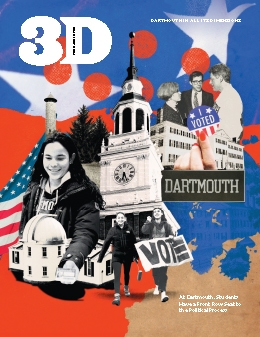Jacques Steinberg: Lee, as you think about using testing going forward or how you used it pre-pandemic, can you talk about how it is one factor among many?
Lee Coffin: The idea that a college is holistic in the way we meet each applicant means the application has many components. Some of them are quantitative—transcript, grades, the GPA from those grades, the rigor of the curriculum, and then testing. In addition to that, we have essays and recommendations and interviews and extracurriculars, and more broadly, the story a person tells about herself as an applicant that helps us not just assess the candidacy on its academic merit, but imagine the community we're building on the campus where I work. "Holistic" is all of those things wrapped up together. No one element is more important than the other. The winning combination is that academic preparation and achievement twinned with the story you tell.
JS: Dartmouth announced on February 5th that it was reinstating the SAT. Can you talk about that decision, how it got made, and why?
LC: President Beilock, as a cognitive psychologist, said, "Let's frame our decision to reactivate or remain optional based on some evidence." Michele and Bruce were two of four faculty members who completed a study to look at the role testing plays in our admission process but also as a predictor of performance once students enroll at the College.
Michele Tine: [Our first finding] was, to be totally honest, fairly expected, which is that SAT scores are highly predictive of academic achievement at Dartmouth. When we looked at things that can predict your first year GPA at Dartmouth, SAT all by itself was the best predictor. That wasn't a huge surprise.
The second thing we found was that the SAT was a similarly strong predictor of academic success at Dartmouth for all different demographic subgroups. There was no evidence that SAT scores systematically underestimated the college performance of a disadvantaged group in some way.
"Students don't fully understand how a given score can be enormously strong given the background that student comes from."
Bruce Sacerdote: The thing that's most important about SAT-optional policies is that we found they can be quite harmful to less-advantaged students who don't always know when they should submit. In particular, less-advantaged students don't fully understand the way in which their scores can be used in context and how a given score can be enormously strong given the background that student comes from. They could have a score at the median or even the 25th percentile for Dartmouth that might be at the 99th percentile of their high school and their neighborhood, and that is a very strong signal of how well that student is going to do.
To put it bluntly, we discovered that we're missing out on hundreds and hundreds of really talented kids from less-advantaged places that weren't submitting their scores. We found that test-optional policies can be a real hindrance to people identifying themselves to Dartmouth as really talented.
"If I can do anything as we have this conversation about testing, it is to debunk the idea that any given score is 'high' or 'low.'"
JS: Lee, as this research was shared with you, what was your takeaway, particularly as it pertains to applicants wondering how to size up their scores?
LC: If I can do anything as we have this conversation about testing, it is to debunk the idea that any given score is "high" or "low." All testing is contextualized. The score is reviewed from the place where it was generated. What are the norms where you live, where you go to school? How did you do in relation to those norms?
There's this misperception that scores are "low" or "high" based on their number between 800 and 1600, when in fact, the 1200, the 1400, the 1190 is considered within the school that the student attends. So a 1200 on the SAT at a school where the mean is an 850 is, in this example, a remarkably high score from that place, and we read it accordingly. There are other schools where there is a lot of preparation, there's more cultural alertness to testing as an element of admissions, and the means are high. And so a 1400 in that high school might be less noteworthy because everybody's at or above that data point. We're not discounting it, but it in and of itself doesn't tell us the same thing.
JS: What I'm hearing you all saying is that your score relative to the rest of your high school may be more important than that median score of the college that's reporting. Is that fair or not?
LC: If you just took a PSAT or you're about to take the SAT, go with that score report to your guidance counselor or a teacher, and say, "Okay, what's the norm in this school?" The school profile that they share with us usually gives us that range. If your scores are above that, you're in a really good spot. And if you're above the 75th percentile, you're in an even stronger spot. As readers, we're able to say, "This 1350 from that high school is 410 points higher than the mean. That's a really powerful stat inside our evaluation process." And that will empower you to know that, "Oh, my scores really are strong coming from the school where I am a student." It absolutely helps disadvantaged students, but there are middle-income kids who go to public high schools where they're making the same miscalculation—not because they mean to, but it's just not clear.
JS: The SAT has long been regarded in counseling circles as a test that is biased, that favors some over others, including those who can afford prep or can be correlated in part to the academic achievements of one's parents or the level of language spoken in one's home.
MT: I'm really glad you brought that up, because the SAT score is not a biased statistical predictor of academic achievement in college. That is true. But there are income-related and racial differences in average SAT scores that are profound and large in the United States of America and on almost every college campus. On average, higher-income students score higher than low-income students; white and Asian students score higher than Black and Latino students. And this is the very main point that critics of the SAT make, and they are accurate. Those gaps exist.
What's a little less accurate is linking these very real concerning gaps to the conclusion that the SAT therefore must itself be a biased measure. Evidence suggests that those gaps are more of a reflection of very deep systemic inequity in our K through 12 educational system and society at large as opposed to the SAT being a biased test. That's why Dartmouth reads test scores in context.
"Evidence suggests that those gaps are a reflection of very deep systemic inequity in our K–12 educational system as opposed to the SAT being a biased test."
LC: What Michele said is exactly what we do. I have been struck over and over throughout my career that the public high schools that are probably playing each other in high school sports have very different opportunities in the high schools themselves. And we go into each one and we say, "What's happening here and how do we look school by school for opportunity or the challenges that exist there?" And we read accordingly.
JS: So Bruce, if you were sitting with a family at their kitchen table, what practical advice for them would you draw from the research?
BS: The overarching theme is that you're stronger than you think you are. Do not count yourself out. And then, secondarily to that, take to heart Lee's point about, if it's a test-optional school, think about where that falls in the context of your application, your other accomplishments, the other things that really show who you are as a person.
"The overarching theme is that you're stronger than you think you are."
MT: Students need to keep in mind for those test-optional schools that when they're reporting their median scores on the website, it's just the median scores of those submitted. So there's going to be this inflation that happens year after year after year.
LC: We have a peer recommendation. Most places don't. We have an interview that's still evaluative. A lot of places have moved away from that. What are the other pieces of this admissions puzzle that the college is also inviting you to share? Those count. Those are elements, qualitative elements, but nevertheless important ones that help you tell your story.
Listen to the full episode on the Admissions website or wherever you get your podcasts.





